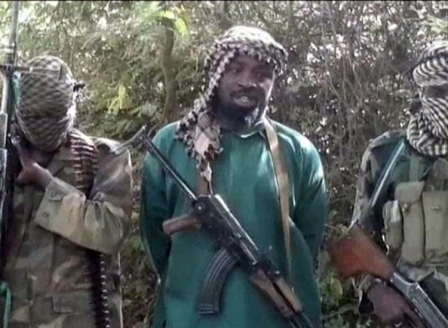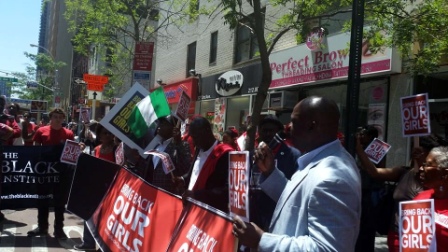Is the Boko Haram menace rooted in poverty or fanaticism?
The world has suddenly woken up to the terrorism of Boko Haram. It has dawned on many people across the globe that Nigeria for the past five years has been fighting a mini al-Qaeda group that is poised to visit on the country and in fact on the region-atrocities worse than September 11 attacks.
The abduction of at least 200 school girls by this terrorist group has shocked particularly the western world into acknowledging that Boko Haram is a vicious Islamist militant organisation that poses serious threats to peace and security in the region.
Unfortunately, some segments of the western press are trying to present these terrorists as villains, reacting to rampant poverty and agitating for development.
Some analysts have even tried to underplay the Jihadist thrust of this terrorist group.
They argue that the Boko Haram attacks are a result of pervasive poverty in the region and the neglect of the Nigerian government. They maintain that Islamic long suffering resignation has turned into anger and desperation; and that Boko Haram is the face and front of this righteous and justified anger. These analysts say that Boko Haram militants are using their attacks and kidnapping to draw the attention of the government to their marginalized predicament.
Any intelligent member of the Nigerian society knows that nothing can be further from the truth.
I have been writing about the activities of this extremist group for years. And I have followed with interest the activities of fanatics and theocrats in the region. I can understand why some segments of the press in Europe and the United States would want to omit the Islamic component in this ‘holy war’ and interpret the situation differently. They want to avoid being accused of Islamophobia. They do not want to be seen to be criticizing Islam even when such criticism is necessary, as in this case.
And this has led to a misrepresentation of the situation in Nigeria – a misrepresentation that is largely responsible for the reactive rather that a proactive approach to addressing the problem.
Boko Haram is a jihadist group whose campaign of violence and bloodletting is rooted in its fanatical interpretation and appropriation of Islam. Its name, Boko Haram, a hausa language expression which roughly translates ‘western education is forbidden’ or non-Muslim teaching is forbidden, says it all. The militants are attacking and destroying ‘western’ styled schools. They are attacking and bombing churches where non-Islamic doctrines are taught. They have attacked some mosques and killed Muslim clerics critical of their mission.
Boko Haram’s other name-Jam’at Ahl as-Sunnah lid-da’wa wal-Jihad- tells us more about the group’s vision. The rough translation is “The Fellowship of the People of the Tradition for Preaching and Holy War”. Boko Haram’s campaign is against western style education and for the propagation of Islamic tradition, preaching and holy war.
In what way does this translate to a righteous indignation over the long suffering and poverty in Bornu and other states in Northern Nigeria? How does bombing mosques, churches and schools imply agitating for the development? How does killing and kidnapping foreigners attract attention to poverty in the region?
Boko Haram has always made clear its mission – the establishment of sharia in Nigeria. It is opposed to the way sharia is currently being implemented in Muslim majority states. Boko Haram wants a more radical enforcement of the Islamic law. But the quest for sharia law is not new to Nigerian history and politics. Delegates from Muslim majority states led by Alhaji Shehu Shagari staged a walk out during the 1978 constituent assembly following the rejection of sharia law. The then government brokered a compromised and some aspects of sharia – the Muslim personal laws – were included in the 1979 constitution.
Was the walk out by those theocrats a sign of long suffering and marginalization of their states? Alhaji Shehu Shagari, who led the walk out, became president. The army led by military officers from the Muslim majority states toppled him in 1983 and ruled the country till 1999. Does it mean that these military officers – Muhammadu Buhari, Ibrahim Babangida, Sani Abacha and Abudusalami Abubakar – who ruled Nigeria during this period, impoverished and marginalized their own region?
Shortly after Nigeria’s return to democratic rule in 1999, the governor of Zamfara State, Alhaji Sani Yerima, imposed sharia on the state, in fulfillment of what he calls an election promise. Was this election promise a factor of poverty and neglect?
Other Muslim majority states followed and adopted sharia. Sharia implementation led to bloody riots and clashes between Muslims and Christians in some states across Northern Nigeria. It has made religious militancy a way of negotiating space in Northern Nigeria till date. Muslim militants and jihadists mobilized across the country to further the cause of sharia and political Islam. This was the circumstance that led to the emergence of Boko Haram. The group has become the radical face of political sharia that prevails in Northern Nigeria.
The group draws from the reserve army of indoctrinated Muslim youths to advance its cause. Young Muslims are brainwashed by clerics in mosques and ‘scholars’ in Quranic schools with hateful and intolerant messages. Their minds are poisoned with dogmatic and absolutist doctrines. They are made to believe that Boko Haram is fighting Allah’s cause and that if they die fighting this jihad, they will inherit paradise.
The menace of Boko Haram is rooted in the nihilistic ideology of Islamism, not poverty, suffering or neglect.
By Leo Igwe
Stay with Sierra Express Media, for your trusted place in news!
© 2014, https:. All rights reserved.




